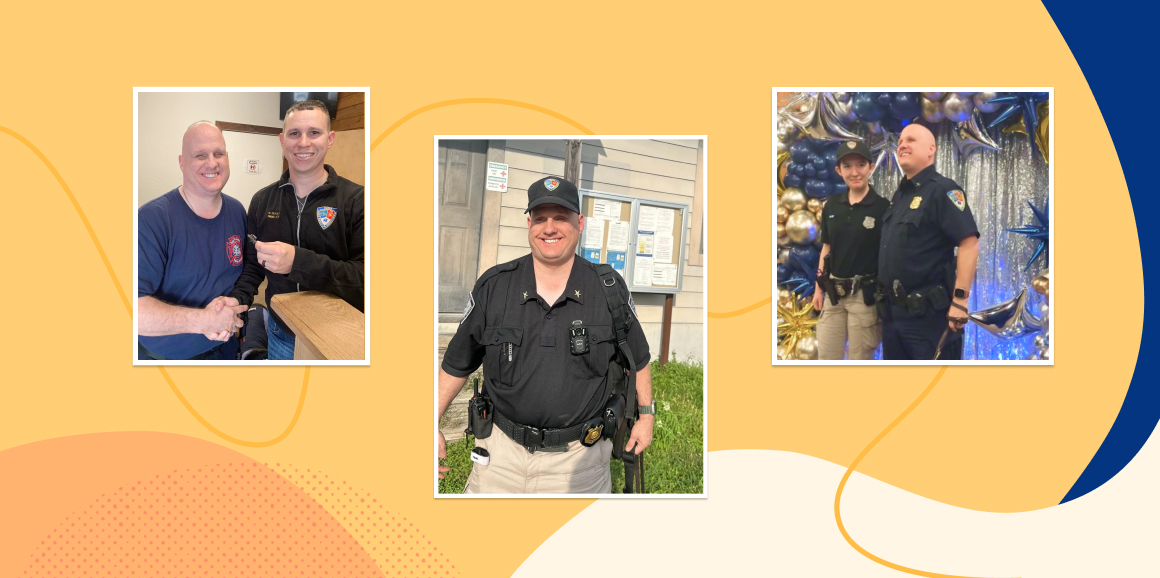Listen to this story as a podcast on Spotify.
Key points we cover:
- Roberts Career Background: From Aspiring Voice Actor to EMR
- How Robert Used Pocket Prep to Overcome Accessibility Challenges
- Robert’s Inspiring Message to the EMS Community
- Tips for Other EMS Inspired by Robert’s Journey
Robert Dittman is Chief of the Internal Affairs Division at Texas Public Safety and Investigations, which is located outside of Austin, Texas. He investigates misconduct allegations and supervises over 400 police officers, firefighters, medics, and security personnel.
Robert’s success is rooted in resilience. After losing most of his sight at birth as a result of a condition called retinopathy of prematurity, the same condition that affected Stevie Wonder, Robert transitioned from partially sighted to completely blind in his teenage years after a blow to the head while wrestling. Robert has become an advocate for people with disabilities and a champion for the blind community, leading life by example with an adventurous, can-do attitude.
Robert’s Career Background: From Aspiring Voice Actor to EMR
Like many people, Robert’s career journey wasn’t as linear as originally anticipated. “I thought I was gonna be a voice actor,” he says about his Bachelor’s degree in Mass Communications from the University of Texas at San Antonio. Robert is a talented singer and musician who had initially planned to pursue a career in the entertainment industry. “The problem with voice acting is, even if you’re good at it, you’ve gotta move to New York or LA, and I just wasn’t ready to leave Texas.” Robert is a Texas native who currently resides in Seguin with his wife, Kirstiana, and their newborn daughter.
Early in his career, Robert expressed doubts about what he wanted to do. For a short period, he worked in IT, teaching the blind and visually impaired how to use computers. Over the years, he also served as a dedicated member of the U.S. Coast Guard Auxiliary alongside other U.S. military organizations, an experience which prompted him to pursue a degree in law over his lifelong passion for the arts. In 2012, after graduating from Saint Mary’s University School of Law in San Antonio, he opened his private practice and served as a criminal defense lawyer for over a decade. In 2023, however, Robert made his latest career switch when a friend extended an unexpected job offer.
Making the career switch to public safety
“I practiced criminal defense for about 12 years,” he recalls, “and then my friend, who is a peace officer, started a public safety company. He calls me up, and he says, ‘Why don’t you come and work with me, and I’ll make you a security officer.'” Robert chuckles in disbelief. “I literally told him, I said, ‘You’re out of your mind.’ But he goes, ‘No seriously, you can do this.'” Robert admits, “I think it was one of the few times I actually doubted myself, but he believed in me,” he says about TXPSI Director Nicholas Teague.
After a period of hesitant deliberation, Robert left his private law practice to join Texas Public Safety and Investigations as Chief of the agency’s Internal Affairs Division. Over the next few months, Robert would be tasked with gaining numerous qualifications in law enforcement, firefighter, and EMS training to build an in-depth familiarity with the industry’s best practices. This would include ride-a-longs, on-duty experience, and after-action reviews.
Roberts Reasons for Becoming EMR Certified as Someone Who is Blind
“How do you know if someone did it right if you don’t know what they know?” Robert says about his training at the Texas Public Safety Training Academy. “When I initially got this job, my colleagues in the attorney world said, ‘Well, you can do that as outside counsel’ or ‘You can do that as an attorney in a suit and a tie,’ but I respectfully disagree […] When you’re wearing the same uniform as your brothers and sisters, when something happens, I’m going to get it more than somebody who’s removed from the outside.”

Robert feels that his personal experience within all disciplines at his agency has better equipped him with the knowledge to more thoroughly understand and, therefore, investigate any allegations of misconduct that directly affect his team. As a result, when faced with the opportunity to pursue the NREMT EMR certification, Robert took the opportunity to certify his abilities to respond to emergency calls, assist those in need of medical attention, and perform basic life-saving procedures.
Studying for the EMR Exam
When asked about studying for the EMR certification exam, he admits, “The test is challenging. There’s no doubt about it. Absolutely. But a lot of it is scenario-based. It’s like talking with a friend and saying, well, if this happens, what do you do?” Robert mentions his colleague, a flight paramedic, who refers to the thought process as a checklist. “If you can go through the checklist of, are they breathing? Do they have a pulse rate? Is there blood? […] Then you’re on the right track. Studying for the exam was basically learning that thought process and then being able to answer the scenario-based questions,” he explains.
Why EMS knowledge matters for everyone
Robert says that his prior experience in medical emergencies reassured him that his certification knowledge would always be of benefit. “There’s a phenomenon in EMS called the bystander effect, [which] means that people freeze. That doesn’t mean they’re not wanting to help, and it doesn’t mean that they aren’t capable of helping, it’s just that when things start to go bad very quickly, it’s a very normal response for people to just freeze.” Robert explains, “Well, being blind, I don’t really have that as much as most people because I can’t see the blood or the severity of the situation. So a lot of times, I’ll jump in.”
He recalls an incident that occurred during his college years when a student outside of his pre-law class had a medical episode and collapsed. As those around him stood stunned, he found himself amongst the crowd asking the critical, life-saving questions. “That was one of a couple of experiences I had before joining the agency. And so when the opportunity came to take EMS training, of course, I’m gonna step forward and do it because whether you can see or whether you can’t, the knowledge isn’t bad to have.” Robert insists that his EMS knowledge has been invaluable, not only on the job but also in his personal life as well, giving him greater confidence in his ability to support his wife, Kirstiana, throughout her pregnancy.
How Robert Used Pocket Prep to Overcome Accessibility Challenges
Studying with Pocket Prep
In December of 2023, Robert passed his EMR exam to become the first blind Nationally Registered EMR alongside his wife, Kirstiana, who also recently attained her certification as well. Together, Robert and Kirstiana use Pocket Prep to gamify their studying year-round. “I remember a famous person in a famous film once said, ‘If there is a task to be done, there’s an element of fun. And if you find the fun, it becomes a game.’ Well, that would be what Pocket Prep is. My wife and I see who can get the Question of the Day, and then we text each other and say, ‘Oh, I got it’ or ‘Aw, I missed it’ and ask, ‘Well, why did you miss it?’” He says. “You’re learning things while you’re doing something fun. I would not hesitate to emphasize that a lot.”
Why accessible software matters
Despite successfully passing his certification exam, Robert encountered numerous obstacles throughout his study journey. “Being blind,” he says, “it’s a challenge of having software that is accessible. Blind people access computers and cell phones using a screen reader.” He explains, “Not all websites or software or interfaces are accessible. When they’re good, they’re great, but when they’re not good, it’s it just says ‘button, button, button,’ and I know I’ve got three buttons down there, but I don’t know which one does what. I have to say that Pocket Prep was one of the five or six different software that I tried that was 100% accessible. And my hat’s off to the developers. I think they did a great job on that. They probably never thought that a blind person was actually gonna use it,” he laughs.
Robert uses similar speech-assisted technologies to take patient vitals while on duty, which includes equipment that will read a patient’s temperature and blood pressure to him out loud. “I didn’t know any of this equipment existed until my colleague, who’s a paramedic, said, ‘This stuff exists, let’s get it for you!’” He demonstrates the equipment by swiftly navigating his EMS bag to show its ease of use. Despite being EMR certified and fully capable of helping patients independently, Robert says that he regularly collaborates with his peers and is always learning new things while on the job.
Continuous learning builds community
“In the public safety, EMS community, or any kind of public safety or emergency response venue, you’re gonna have people [to rely on because] we work as a team […] It’s never wrong if you don’t know something to call somebody and say, ‘I think this is what it is, but I could use some help.’” Robert appreciates always being able to count on his partner, an EMT at his agency, for advice on how to handle unfamiliar situations. “If someone gets into EMS, they’re joining a community of people that want to help you get it right […] and so passing the test is the first step to joining a community of really great people that just wanna save lives and help people.”
Robert’s Inspiring Message to the EMS Community
In addition to being EMR certified, Robert is also trained as a wildland firefighter and security officer. In the future, he hopes to pursue additional certifications to solidify his knowledge as a Tactical Responder, Firefighter I, and EMT.
He admits, “Not every agency is like mine. Texas Public Safety and Investigations believes in giving everyone an opportunity to succeed. My Director has been a champion of utilizing people with disabilities.” Robert hopes that the EMS community will welcome people with disabilities and allow them to contribute their skills and knowledge to a good cause. “Perhaps [my story] will change some perceptions and change some minds,” he reflects.
“My argument to anyone who’s blind or visually impaired, or to anybody that says ‘I can’t.’ Yes, you can. Yes, you can. There’s no reason why you can’t.” Robert praises his support system of close friends and work colleagues who have continually encouraged him throughout his professional journey. “Everybody has a part to play. And if you are willing to get the knowledge using things like Pocket Prep and other aids, then you can be a part of the solution. In the disabled community, a lot of people, unfortunately, believe that disabled people are a burden to the community or we’re the ones always needing help. It certainly flips the table when we’re the ones saying, ‘I’m an emergency medical responder. I’m here to help you […] That’s what makes me happy.”
Tips for Other EMS Professionals Inspired by Robert’s Journey
If Robert’s journey has inspired you, here are some actionable study tips to help you on your path to exam success:
- Find Ways to Make Studying Fun: Find new ways to make studying fun by changing up your study routine.
- Teamwork Makes the Dream Work: Consider studying with a partner or finding a study group to make preparing for your exam a team effort.
- Use Reliable Study Tools: Invest in study apps like Pocket Prep that offer practice questions, detailed explanations, and flexibility.
- Make Small Incremental Progress: Avoid the stress of cramming by using study techniques like micro-learning to make preparing for your exam more approachable over a longer period.
Pocket Prep offers quiz-based exam prep for the NREMT® EMR exam and six other EMS exams. It’s available as an app on iOS and Android devices and on the web. We’re proud to have worked with Ablr to audit and improve the accessibility of our products. You can learn more about the accessibility of our products in our accessibility statement. Pocket Prep is free to download and try.

 I’m a Pocket Prep Success Story
I’m a Pocket Prep Success Story

